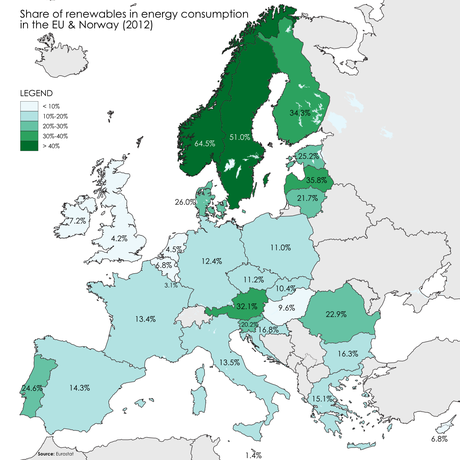According to the report, Britain gains only 4.2% of its energy from green sources, with only Malta (1.4%) and Luxembourg (3.1%) performing worse. The survey included the 28 European states in the EU28 program, which is a commitment to hit green energy targets by 2020.

<a href="http://blog.theecoexperts.co.uk/Eurostat-EU-Renewable-Energy-Report"><img src="http://www.blog.theecoexperts.co.uk/sites/default/files/filemanager/ EU-Renewables-Map.png " alt="EU Renewables Map" title="Eurostat Report 2014" /></a><br><a href="http://www.theecoexperts.co.uk">The Eco Experts</a>
Norway Leads the way
The survey recorded the percentages of total energy consumption between 2004-2012, and although Britain has increased its share by 3% over the 8 years, this leaves them far short of achieving the 15% target.The most effective producer of renewable energy, according to the report is Norway, who produces 64.5% of its energy from renewable sources. Other European countries have also already reached their targets, with the report stating that Estonia, Bulgaria and Sweden have already reached 2020 targets. Europe as a whole has performed quite well with it’s “share of renewables in energy consumption is up to 14% in 2012”.
This puts more pressure on England to do their bit, especially when neighbours France and Germany have performed better, but still below average, against their targets with 13.4% and 12.4% scores respectively. This is more than 10 times better than Britain’s poor effort, which falls far below at 4.2%.
What happened to the 'Greenest Government Ever?'
This is in contrast to the claims from the Prime Minister, who said, shortly after election to the DECC, “We have 5 years to make the decisions that will get this country on track and nowhere are long term decisions more needed than in the fields of energy, climate change and the environment… I want us to be the greenest government ever.”“We’ve got a real opportunity to drive the green economy, to have green jobs and green growth... Clearly there's the climate change agenda where we’ve got to get back on track both nationally and internationally.”
According to a spokesman from the Department of Energy and Climate Change (DECC), given to the Independent on the matter,
“The Government is committed to cost-effective renewable energy as part of a balanced, secure and low-carbon energy mix.” The spokesman also revealed that plans are in place to meet the 2020 target, that 2012’s target was exceeded, and that it was expected that Britain would meet its 2013/2014 target of 5.4%.
However, it is clear that there is still a long way to go. The 2020 target of 15% would not be reached if Britain continues to rise only on the current trajectory. The DECC has been allocate £40 million between now and 2020 in order to help reach these targets for renewable energy.
